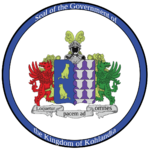Kohlandian Government
Her Majesty's Government of the Kingdom of Kohlandia | |
|---|---|
 | |
| Type | |
| Type | Governmental body |
| Leadership | |
Vacant | |
Deputy Prime Minister | Vacant |
Vacant | |
| Seats | Variable |
| Meeting place | |
| Tesrin Place, Dunhallow | |
The Government of Kohlandia is composed of a unicameral House of Parliament lead by The Crown in Parliament and split into three branches: the Executive, the Legislative and the Judicial. The Executive and Legislative branches are partially intertwined, with the members of the former being appointed from the latter, while the Judicial branch is separated by law and the Constitution.
The Crown is the Head of State and Constitutional leader of the Government, with the Prime Minister being the Head of Government and second in line of primacy. The Deputy Prime Minister is third in line, with the Speaker of the House being fourth.
Executive Branch
The Executive branch is composed of the Cabinet, headed by the Prime Minister. This branch administers the governance of Kohlandia and is what most Kohlandian citizens think of as "the Government"". The Prime Minister is the only elected member of the Executive branch, with the Ministers serving in it all being appointed to their positions by the Prime Minister.
The exact composition of the Executive will vary depending on the priorities of the Prime Minister but can reasonably be expected to include a Deputy Prime Minister, Foreign Office Minister, Chancellor, Home Office Minister, and Chief Attorney.
Legislative Branch
Parliament, the legislative branch of the Government, contains all adult Kohlandians who have not been rendered ineligible due to criminal sanction or a position within the Judiciary. The Parliament of Kohlandia is a unicameral legislative body administered by the Speaker of the House and lead by the Leader of the House, whose role is mostly ceremonial.
Parliament introduces, debates, amends and votes on all legislation; which can be introduced by the Executive or any member of Parliament. Legislation is passed by a simple majority before moving on for Royal Assent. In cases of legislation that has been denied Royal Assent, or legislation that modifies the Constitution, a supermajority vote in favour is required for the legislation to pass through Parliament.
Judicial Branch
The Judicial arm of the Government is required under the Constitution to remain separate from the Executive and Legislative branches; with all sitting Judges being barred from participating in Parliament or taking office in the Executive. Judges are appointed by the Crown through exercise of the Royal Prerogative, or by Parliament via an Act of Parliament.
Once appointed, Judges sit for 10 years and may request a continuance in post for another 10 years after that. These requests may be granted by Parliament via a simple majority vote.
See Also
References
Available languages for this page:
• English |